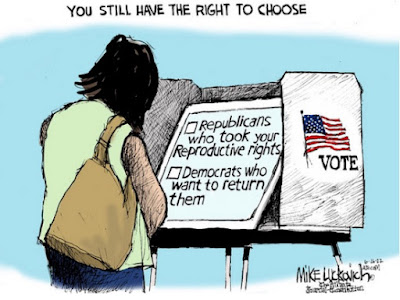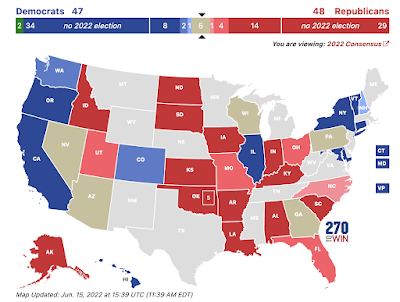The media refer to 2022 as "an election year." In fact, and probably to the detriment of citizen engagement with democracy, every year is an "election year" somewhere and in many places at some level of government.
This is a federal midterm election year during which we'll vote on all 435 members of the House of Representatives, one third of the Senate, and a slew of state governors. It is also a year in which the candidates of the Irresponsible Party -- a nice label for Big Lie-promoting Republicans, don't you think? -- will be seeking revenge for losses in 2020 and to win power going forward. And the history of midterm elections under a new president says they'll have the wind at their backs.
The purpose of this post is to lay out some context for the contests we're all going to live through, as much for my own understanding as any reader's, though perhaps some might find this useful. So here goes:
Gerrymandering: Because 2020 was divisible by 10 and the Census Bureau somehow completed a plausible count of us all as required by the Constitution, states are reapportioning the districts in which we vote for state reps and Congress. Republicans control all branches of government (state legislatures and governors) in 23 states; Democrats in 15; and others are divided. State laws about reapportionment allow for many variations on how districts are drawn, but who is in power has a lot to do with the results, mostly.
In a general way, the predominance of Republicans in many state governments would promise that Congressional maps would grossly favor Republicans. And in some places (looking at you, Tennessee) they do, so far in the process. And in a few Democratic Party controlled states like Illinois, Dems are shoring up their advantages in Congressional seats. But the best-informed observers including Dave Wasserman at the Cook Report and many others don't see Republicans creating many aggressive gerrymanders. Rather,
... Republicans don’t appear likely to gain a significant number of seats through redistricting. Instead, they’ve taken up a new strategy: make red seats redder.
If this is correct, it should seem familiar to Californians. In 2000, the state legislature approved what amounted to an incumbent protection gerrymander: though Dems predominated, they largely made their own members and sitting Republicans invulnerable to challenge for a decade. Only one Congressional seat (won by Democrat Jerry McNerney in the northern Valley) turned over during the '00s, despite growing Democratic margins among the electorate. The sense they'd been disenfranchised encouraged Californians to adopt our current independent Citizen Redistricting Commission to do the job. (We still get mostly Dem Reps because we are mostly Dems.)
Elections for the House of Representatives: Decades of gerrymandering and voluntary self-sorting by political preference mean that hardly any Congressional races are really competitive. As of today, the Cook Political Report points to a measly total of 13, nationally. Some others may develop because of local circumstances or candidate quality. But unless you live in or to next to one of these competitive districts, your political attention is better paid to other offices.
Elections for Governor: Though Republicans have ridden decades of smart gerrymandering to control of many state legislatures, in quite a few of these states the electorate statewide is closely divided. These are mostly "battleground" states in presidential years. And electing Democratic governors to four year terms in 2022 will help protect an honest vote count in 2024 if the Reps try again to override the decision of the voters.
States where elections for governor are critical and where volunteer help and any available cash might be of assistance include:
• Georgia: the inspiring Stacey Abrams will again be on the ballot. This will be very tough, but never count that brilliant organizer out.
• Nevada: Incumbent Democrat Steve Sisolak will be seeking another term.
• Pennsylvania: Attorney General Josh Shapiro is the consensus Democratic candidate. A slew of Reps are running in a primary on May 17.
• Wisconsin: Incumbent Democrat Tony Evers will face whoever wins the Republican primary on August 9. There are at least two well-funded contenders, both Trumpy. Wisconsin has the best organized Democratic Party in the country.
• Michigan: Incumbent Democrat Gretchen Whitmer will try to hold on for another term. A Black Detroit police chief, Jame Craig, is one of the leading Republican contenders; these will face off on August 2.
• Arizona: the governor's office is open as the incumbent Republican is termed out. Secretary of State Katie Hobbs probably leads the Democratic aspirants, while Republicans have a slew of choices including QAnon and Trump-loving news anchor Keri Lake. The primary is August 2.
• Another governor's race I'm watching: in Maine, Trumpish former governor Paul LePage wants to take back the job from incumbent Democrat Janet Mills.
Then there are the Senators. Again, Democrats are quite competitive statewide in places where Republican gerrymanders keep them out of power in the state legislatures.
• Georgia: Incumbent Senator Raphael Warnock looks to be taking on Trump-cult adherent and Georgia football hero Herschel Walker. Since Walker is pretty close to certifiably nuts, this shouldn't be much of a contest, but that assumption disregards the heft of college football in the Peach State.
• Nevada: Incumbent Democrat Catherine Cortez Masto will seek a second term. Her likely opponent Adam Laxalt -- who his family considers him an unworthy usurper of a proud Nevada name -- is a far right wingnut and failed governor candidate. Not going to be easy for Masto though; the Democratic registration advantage in the state is declining.
• Pennsylvania: This open Senate seat has attracted a wild cast of characters in both parties, including the 6'7" tattooed Democratic Lieutenant Governor John Fetterman and, among the Reps, TV-doctor Mehmet Oz. Fortunately the primary is in May, so we'll get a look at the real shape of the contest here fairly early in the year.
• Wisconsin: The Senate's dumbest anti-vaxxer, incumbent Republican Ron Johnson, is up for re-election. If Dems were not so well organized, as the sitting Senator, he'd probably be a shoo-in; the primary for the Dems is late, August 9.
• Arizona: Incumbent Democratic Senator Mark Kelly will face off against one of several Republicans to be chosen in August. The leader among them, a man who needs another vowel, sitting Attorney General Mark Brnovich, figured out his own advancement meant he had to support Donald Trump's Big Lie against his own Republican election officials in this battleground state.
• North Carolina: This open seat will be an attractive prize for Democrats as their nominee for the state's other Senate seat only lost by 1.8 percent in 2020 while Trump won the state. The sitting governor is a reasonably popular Democrat, so Dems see a chance. There's a wide field of Dem and Rep candidates running in a June 7 primary (date subject to all sorts of litigation over House seat boundaries; North Carolina is Republican Congressional gerrymander ground zero.)
• I'll be watching also New Hampshire, Ohio and Missouri where the vagaries of electoral contests might shake up Senate prospects -- though probably not, as party polarization is such a strong force.
Whew!!! Gonna be a tough year -- and as much Democratic Party success as can be won matters desperately to the preservation of some remnant of U.S. democracy.
Those of us who care need to pick the most plausible contests and be ready to donate and work.
Finally, if figuring all this out is just too much, and you have some cash, consider supporting Swing Left's national fund which prioritizes smartly for us.









